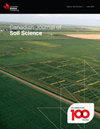确定维持或增加土壤碳的轮作和耕作方法及其与土壤健康的关系
IF 1.5
4区 农林科学
Q4 SOIL SCIENCE
引用次数: 0
摘要
土壤有机质物理组分(SOM)是公认的管理变化指标,可用于评价土壤碳储量和储存潜力。在这里,我们使用SOM物理组分和土壤质地来确定维持或增强安大略省农业土壤土壤健康和碳储存的管理实践。利用国家土壤数据库的元数据估算碳储存潜力并计算碳亏缺。绘制的地图显示了安大略省农业土壤的碳赤字,并表明这些土壤有可能在土壤的顶部20厘米处储存额外的0至2kgm - 2。在四个长期农业试验(德里、埃罗拉、渥太华和里奇敦)中,耕作制度一般对碳赤字的大小没有影响。仅在Ridgetown和玉米-大豆轮作中存在显著的耕作效应,常规耕作的碳亏缺为2.95gCkgsoil - 1,而不耕作的碳亏缺为8.97gCkgsoil - 1。在Elora和Ridgetown发现了统计上显著的作物轮作效果。在Elora地区,连续苜蓿的碳亏缺最小(7.25gCkgsoil - 1),玉米-大豆轮作的碳亏缺最大(12.07gCkgsoil - 1)。在Ridgetown,玉米-大豆轮作的碳亏缺最小(2.95gCkgsoil−1)。回归分析显示两者呈弱负相关(R2=0.11;P<0.001)。这表明仅增加SOM水平可能不会改善土壤健康。本文章由计算机程序翻译,如有差异,请以英文原文为准。
Identifying rotation and tillage practices that maintain or enhance soil carbon and its relation to soil health
Abstract Physical fractions of soil organic matter (SOM) are established indicators of management-induced change and have been used to estimate the soil carbon storage capacity and storage potential. Here, we use SOM physical fractions and soil textures to identify management practices that maintain or enhance soil health and carbon storage in agricultural soils in Ontario. Metadata from the National Soil Database were used to estimate carbon storage potentials and calculate carbon deficits. A map was created showing carbon deficits in Ontario's agricultural soils and indicates that these soils have the potential to store an additional 0 to 2kgm−2 in the top 20cm of the soil. Tillage system generally had no effect on the size of the carbon deficit at four long-term agricultural experiments (Delhi, Elora, Ottawa, and Ridgetown). There was only a significant tillage effect at Ridgetown and only in the maize–soybean crop rotation, where the carbon deficit was 2.95gCkgsoil−1 under conventional tillage compared to 8.97gCkgsoil−1 with no tillage. A statistically significant effect of crop rotation was detected in Elora and Ridgetown. In Elora, continuous alfalfa had the smallest carbon deficit (7.25gCkgsoil−1) and maize–soybean rotation had the largest deficit (12.07gCkgsoil−1). In Ridgetown, the maize–soybean rotation had the smallest carbon deficit (2.95gCkgsoil−1). Regression analysis showed a weak negative relationship (R2=0.11; P<0.001) between carbon storage deficits and soil health scores. This suggests that increasing SOM levels alone may not improve soil health.
求助全文
通过发布文献求助,成功后即可免费获取论文全文。
去求助
来源期刊

Canadian Journal of Soil Science
农林科学-土壤科学
CiteScore
2.90
自引率
11.80%
发文量
73
审稿时长
6.0 months
期刊介绍:
The Canadian Journal of Soil Science is an international peer-reviewed journal published in cooperation with the Canadian Society of Soil Science. The journal publishes original research on the use, management, structure and development of soils and draws from the disciplines of soil science, agrometeorology, ecology, agricultural engineering, environmental science, hydrology, forestry, geology, geography and climatology. Research is published in a number of topic sections including: agrometeorology; ecology, biological processes and plant interactions; composition and chemical processes; physical processes and interfaces; genesis, landscape processes and relationships; contamination and environmental stewardship; and management for agricultural, forestry and urban uses.
 求助内容:
求助内容: 应助结果提醒方式:
应助结果提醒方式:


